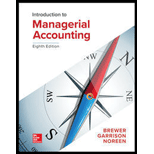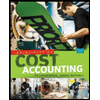
Concept explainers
What is a relevant cost?
Determination of relevant cost describes the concept of relevant concept in decision making. The relevant cost is the cost which has the impact of change with the implementation of decision.
To Discuss:
The concept of relevant cost
Answer to Problem 1Q
Solution:
The relevant cost is the cost which has a behavior of change with the change in decision in making. It refers to incremental cash outflows to be incurred as a result of decision implementation, opportunity cost to be foregone for implementing the decision and the cost avoided with the implementation of decision.
Explanation of Solution
The Relevant cost in the decision making is a cost which has the relevance while taking up the decision. These are referred as all those cost which has the impact of change (whether increase or decrease) with the implementation of decisions taken. These are referred as following cost:
- Cash outflows need to be undertaken for implementing any project/ decision is the relevant cost for the project/ decision.
- If the decision is to choose between the alternatives, then the relevant is the incremental cost to be incurred in a particular alternative than the cost incurred in other alternative.
- The Relevant cost also includes the opportunity cost of the next best alternative. The opportunity cost is the amount of revenue/ income generated from present project, which has to be sacrificed for undertaking the new opportunity.
- The relevant cost is the cost which can be avoided if the decisions taken.
To conclude, it can be said that the relevant cost is the cost which changes with the decision making and measuring these cost will have an impact on decision making.
Want to see more full solutions like this?
Chapter 11 Solutions
Introduction To Managerial Accounting
- Sharon Mars, a recent graduate of Bell's accounting program, evaluated the operating performance of Carla Vista Company's six divisions. Sharon made the following presentation to Carla Vista's board of directors and suggested the Percy Division be eliminated. "If the Percy Division is eliminated," she said, "our total profits would increase by $25,300." The Other Five Divisions Percy Division Total Sales $1,663,000 $100,900 $1,763,900 Cost of goods sold 978,400 76,500 1,054,900 Gross profit 684,600 24,400 709,000 Operating expenses 528,500 49,700 578,200 Net income $156,100 $(25,300 ) $130,800 In the Percy Division, cost of goods sold is $60,100 variable and $16,400 fixed, and operating expenses are $29,100 variable and $20,600 fixed. None of the Percy Division's fixed costs will be eliminated if the division is discontinued. Is Sharon right about eliminating the Percy Division? Prepare a schedule to support your answer. (Enter negative amounts using either a negative sign preceding…arrow_forwardhello tutor please help mearrow_forwardaccounting questionarrow_forward
- Mark purchased 200 shares of stock for $40 per share. During the year, he received $500 in dividends. He recently sold the stock for $55 per share. What was Mark's return on the stock? a) $3,500 b) $4,000 c) $3,900 d) $4,500arrow_forwardSummit Industries has a normal capacity of 30,000 direct labor hours. The company's variable costs are $42,000, and its fixed costs are $18,000 when running at normal capacity. What is the standard manufacturing overhead rate per unit? a) $1.50 b) $1.60 c) $2.00 d) $2.10arrow_forwardIvanhoe, Inc. has recently started the manufacture of Tri-Robo, a three-wheeled robot that can scan a home for fires and gas leaks and then transmit this information to a smartphone. The cost structure to manufacture 20,400 Tri-Robos is as follows. Cost Direct materials ($51 per robot) $1,040,400 Direct labor ($39 per robot) 795,600 Variable overhead ($7 per robot) 142,800 Allocated fixed overhead ($29 per robot) 591,600 Total $2,570,400 Ivanhoe is approached by Tienh Inc., which offers to make Tri-Robo for $116 per unit or $2,366,400. Following are independent assumptions. Assume that none of the fixed overhead can be avoided. However, if the robots are purchased from Tienh Inc., Ivanhoe can use the released productive resources to generate additional income of $375,000. (Enter negative amounts using either a negative sign preceding the number e.g. -45 or parentheses e.g. (45).) Direct materials Direct labor Variable overhead Fixed overhead Opportunity cost Purchase price Totals Make…arrow_forward
- correct answer pleasearrow_forwardcost accountingarrow_forwardSummit Holdings has $280,000 in accounts receivable that will be collected within 70 days. The company needs cash urgently and decides to factor them, receiving $260,000. Skyline Factoring Company, which took the receivables, collected $275,000 after 85 days. Find the rate of return on this investment for Skyline.arrow_forward
 Principles of Cost AccountingAccountingISBN:9781305087408Author:Edward J. Vanderbeck, Maria R. MitchellPublisher:Cengage Learning
Principles of Cost AccountingAccountingISBN:9781305087408Author:Edward J. Vanderbeck, Maria R. MitchellPublisher:Cengage Learning Managerial Accounting: The Cornerstone of Busines...AccountingISBN:9781337115773Author:Maryanne M. Mowen, Don R. Hansen, Dan L. HeitgerPublisher:Cengage Learning
Managerial Accounting: The Cornerstone of Busines...AccountingISBN:9781337115773Author:Maryanne M. Mowen, Don R. Hansen, Dan L. HeitgerPublisher:Cengage Learning Cornerstones of Cost Management (Cornerstones Ser...AccountingISBN:9781305970663Author:Don R. Hansen, Maryanne M. MowenPublisher:Cengage Learning
Cornerstones of Cost Management (Cornerstones Ser...AccountingISBN:9781305970663Author:Don R. Hansen, Maryanne M. MowenPublisher:Cengage Learning- Principles of Accounting Volume 2AccountingISBN:9781947172609Author:OpenStaxPublisher:OpenStax College
 Survey of Accounting (Accounting I)AccountingISBN:9781305961883Author:Carl WarrenPublisher:Cengage Learning
Survey of Accounting (Accounting I)AccountingISBN:9781305961883Author:Carl WarrenPublisher:Cengage Learning Managerial AccountingAccountingISBN:9781337912020Author:Carl Warren, Ph.d. Cma William B. TaylerPublisher:South-Western College Pub
Managerial AccountingAccountingISBN:9781337912020Author:Carl Warren, Ph.d. Cma William B. TaylerPublisher:South-Western College Pub





